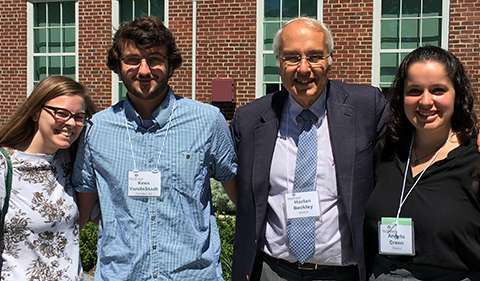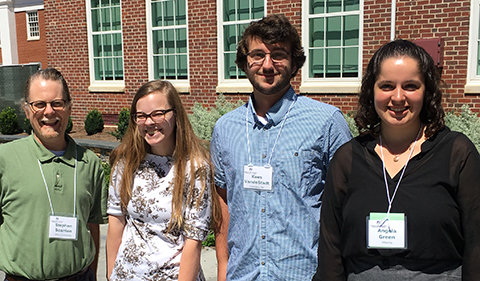
Ohio University interns Chloe Wooster, Kees Vande Stadt, and Angela Green with Shepherd Higher Education Consortium on Poverty Founder and Executive Director Dr. Harlan Beckley
Dr. Steve Scanlan, Associate Professor of Sociology at Ohio University, participated in the 2017 Shepherd Higher Education Consortium on Poverty Closing Conference and Symposium in July.
 Scanlan oversees Ohio University’s participation as a member of the consortium in collaboration with Dr. Rachel Terman (SHECP OHIO intern coordinator) and Dr. Matthew Layton (SHECP OHIO academic director) from Sociology and Political Science respectively, with whom he obtained a grant from the 1804 Fund to support OHIO membership and interns. Participation in SHECP is a component of the Wealth and Poverty theme. Scanlan serves on the SHECP Council, a sounding board for the organization with representatives from each of its member institutions.
Scanlan oversees Ohio University’s participation as a member of the consortium in collaboration with Dr. Rachel Terman (SHECP OHIO intern coordinator) and Dr. Matthew Layton (SHECP OHIO academic director) from Sociology and Political Science respectively, with whom he obtained a grant from the 1804 Fund to support OHIO membership and interns. Participation in SHECP is a component of the Wealth and Poverty theme. Scanlan serves on the SHECP Council, a sounding board for the organization with representatives from each of its member institutions.
The closing conference consisted of poverty studies workshops and presentations on the summer experiences of SHECP student interns—three of whom are from Ohio University. The symposium topic was “Criminal Justice, Poverty, and Race,” and it was held at the Center for Leadership and Ethics at the Virginia Military Institute in Lexington, VA. The principal speakers included Paul Butler, the Albert Brick Professor of Law at Georgetown University; James Forman Jr., a Professor of Law at Yale University; and Robin Steinberg, the founder and executive director of Bronx Defenders.
Scanlan commented that “the symposium provided an outstanding opportunity for students to engage with experts in the area of criminal justice and inequality,” adding that “this is a defining issue of the day and symposium participants will take away many lessons from the gathering.”
Ohio University’s three interns were Angela Green, Chloe Wooster, and Kees Vande Stadt, all of whom are pursuing a Certificate in Wealth and Poverty Studies. Scanlan notes that “the internships provide a hands-on and very meaningful experience for the students and drive the interests and goals of SHECP and the importance of poverty studies.” Scanlan noted the powerful messages students brought back with them from their experiences working in the areas of homelessness, housing and community development, and medical social work.

Dr. Steve Scanlan with Ohio University interns Chloe Wooster, Kees Vande Stadt, and Angela Green.
About the Shepherd Higher Education Consortium on Poverty
According to the organization’s website, SHECP is a nonprofit promoting poverty studies programs in undergraduate and professional schools, that supports a collaborative summer internship integrated with coursework and community engagement opportunities during the academic year. SHECP seeks to maintain and advance a unique interdisciplinary program of study with the purpose of enriching, not replacing, multiple student majors with a principally liberal arts preparation for many different professional and civic vocations. Poverty touches the work of healthcare professionals, lawyers, businesspersons, educators, religious workers, and community development specialists, as well as public policy experts and social workers to name a few. SHECP believes that more citizens informed and committed to diminishing poverty through their work and civic activity are needed. Undergraduate education has largely ignored sustained education in poverty studies except for a few research-oriented programs and SHECP with its current 23 member institutions seeks to expand poverty studies to new university members.
The consortium’s activities include a joint internship program (a collaborative, eight-week “subsistence wage” paid summer program at sites throughout the country with student opening and closing conferences); an annual symposium on a current poverty-themed topic and poverty studies in undergraduate and professional education; facilitating best practices with meetings for faculty and staff of consortium schools; a website for networking and disseminating information; an assessment of members’ poverty studies programming to continually improve SHECP policies and practices; a Board of Directors to plan future activities for the consortium; and consultation with a director to promote and improve programming. By working together to strengthen our programs and inviting others to join us, SHECP seeks to create a national movement that will lead to thousands of graduates each year informed about the causes and remedies of poverty and ready to diminish it through their professional, civic and political engagement.



















Comments